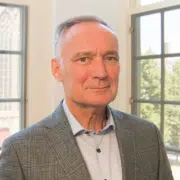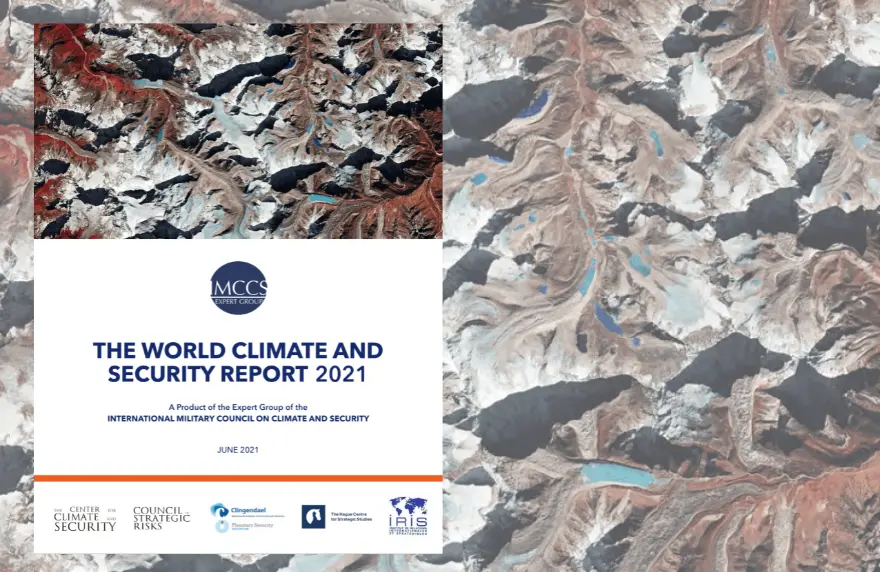The chair of the International Military Council on Climate and Security (IMCCS), Gen. Tom Middendorp (Ret.) recently published a book titled Klimaatgeneraal, or “Climate General.” The book builds on his tenure as the Chief of Defense of the Netherlands to illustrate the relationship between climate change and security risks, before turning to positive solutions to address these interconnected challenges. CCS Research Fellow Elsa Barron spoke with Gen. Middendorp about his identity as a “climate general,” the evolution of the climate security field, and opportunities for climate adaptation and mitigation in the security sector.
Elsa Barron (interviewer): As the Chief of Defense of the Netherlands, how did you initially become concerned about the security impacts of climate change?
General Tom Middendorp (Ret.): Like all militaries in the world, in the Netherlands, we feel the impact of climate change in all of our missions. Impacts such as high temperatures and drought are affecting our work and the terrain we navigate. In all of my missions, I also saw how climate change is affecting our security environment and how it is related to the root cause of conflict. That made me more aware of the impact of climate on our operations, but even then, I didn’t initially make the connection to climate change. That connection came later when I was the Chief of Defense and I conducted strategic sessions on the future of defense and considered major drivers of change. That’s when I realized that climate change might be the biggest driver of the century shaping security risks.
Barron: Are there any on-the-ground experiences from your career that illustrate the interlinkages between climate change, insecurity, and conflict risks?
Gen. Middendorp (Ret.): I’ll start with Afghanistan because I’ve been deployed there several times. The last time I was there, I was a task force commander in the south of the country and there I saw how climate change impacted local security. There was a town that had been flooded by the Taliban, which we had been fighting for days to remove. Eventually, we succeeded, but only to find out that the Taliban could return at any moment because of tensions in the village that they exploited for influence. We ultimately discovered that those tensions were caused by disputes over how to divide the water resources in the province.
Once we mediated a solution regarding the division of water resources, the village suddenly became a quiet area and the Taliban couldn’t regain their influence. The success became tangible a year later when I visited that same town with our [the Netherlands’] current king and we could walk through the main street with limited protection. It illustrates how the security situation can change by addressing a root cause that was, in this case, climate-related.
For me, Afghanistan was a wake-up call. And I saw the same thing happening in other mission areas. In Somalia, we were fighting piracy on the seas, but in fact, we were fighting farmers and fishermen who had been pushed away from their homelands by droughts and cattle failure and needed to sustain their families. They couldn’t find any work, and then they got into the hands of organized crime and extremist organizations. Fighting these farmers and fishermen is like fighting symptoms of a deeper cause, and that deeper cause was climate change. So, if we really want to build security in any region of the world, we need to also look at the deeper root causes beyond conflict.
Barron: After witnessing these interlinkages, what drove you to start speaking out about climate security risks and ultimately gain the title, “Climate General,” which is also the title of your recent book (Klimaatgeneraal)?
Gen. Middendorp (Ret.): It was during my period as Chief of Defense, when we were conducting strategic planning that I came to the realization that climate change was probably one of the biggest challenges of the century and as such also a driver of change for our Defense organization. During that period, I was invited to the Halifax conference in Canada to talk about climate insecurity, not necessarily because I was known for that subject but because I come from the Netherlands where 50% of our population lives below sea level. The conference occurred in the runup to the U.S. elections in 2016 and one of the candidates had just announced that he would step out of the Paris agreement. Suddenly, my topic became a very political one and attracted a lot of attention.
That attention triggered another invitation to speak to the Planetary Security Conference in the Hague. There, I also explained the nexus between climate change and security and it exploded in the Dutch media. Environmental organizations accused me of securitizing their issue. Politicians, especially right-wing politicians, were surprised that a general was addressing a topic like climate change. Others said I should stick to my own business and not interfere with this issue. There was a lot of turmoil. Interestingly, within the military, there was hardly any reaction because most of the soldiers understood this concept and had already experienced how climate change impacted their work.
This was the first time in my tenure as Chief of Defense that I went viral on social media. That gave me the nickname the “Green General” and I decided to wear that name with honor. Later when I resigned from military service, I became more and more devoted to this subject. I met Sherri Goodman, and we decided to join forces and raise the International Military Council on Climate and Security (IMCCS), a powerful global network combining the practical experience of senior military leaders around the world with the scientific research of our research institutes. That’s how it all started and that is why I named my book “Climate General”, which is running well in The Netherlands and which might be interesting to publish internationally.
Barron: The defense sector is a major contributor to greenhouse gas emissions in many countries and militaries rely on fossil fuels to ensure readiness and effectiveness. How can the defense sector contribute to mitigation efforts without affecting their readiness?
Gen. Middendorp (Ret.): Whether we like it or not, mitigation is underway in the civil sector and it will also happen in the military. The challenge for us is to pursue mitigation in a way that does not affect our readiness and our effectiveness. That can be done by starting with our peacetime infrastructure and peacetime equipment. The second level can focus on smaller, lighter capabilities such as unmanned vehicles, air systems, or space systems that hardly need big propulsion systems. The largest challenge is the heavier equipment such as naval vessels, fighter planes, or tanks. Currently, the technology is not developed enough to immediately transition to new propulsion systems. Here, we need to invest in research and development to create solutions for next-generation capabilities.
In addition to mitigating emissions, green technologies can even help us to improve our operational effectiveness. They can help us to become more self-supporting in our missions and provide us with more diversified energy sources, endurance, and operational effectiveness. They can help us reduce the logistical burden and the risks of vulnerable supply lines. And they can help us reduce the noise and heat signatures of our military capabilities. The military has always shown leadership in developing and adopting new technologies. We need to catch up and look at the energy transition as an opportunity to investigate the possibilities of new green technologies that can both mitigate emissions and also improve operational readiness, an argument we make in the latest World Climate and Security Report publication, Decarbonized Defense: The Need for Clean Military Power in the Age of Climate Change.
Barron: What are some key messages that you hope readers of Klimaatgeneraal will take away from your book?
Gen. Middendorp (Ret.): The first key message is that climate change is also a security problem and we need to depoliticize the issue. Security has always been seen as more of a right-wing issue and climate change has always been seen as a more left-wing issue. Yet, they are both very basic issues for the well-being of our societies, so it is most productive to depoliticize them and address them where needed. Secondly, I think it is important for people to become more aware of how climate change affects our security, and this book is about exactly that. It is about making people aware that climate change is affecting their security in their own homes.
Thirdly, about the solutions side, it is important to notice that climate change is not a military problem specifically, it is a whole-of-society problem. In dealing with climate change, we (the Military) can bring part of the solution to the table but we need to develop our role as part of a wider effort with other agencies. The fourth lesson is that we can all contribute to change. Climate change is a very big, complex topic and we can hardly comprehend all of its impacts. People find it hard to understand and to see what they can do to address it. In this book, I give many examples of the difference that individuals can make because I do believe that together we can face this challenge and turn it around.
Interview by Elsa Barron
Source: IMCCS





